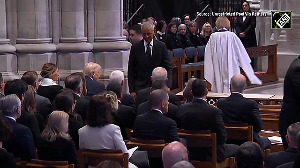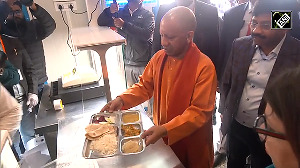On the Indian government's Iraq policy, the public has long witnessed a bizarre drama bordering on the ridiculous. The government could not indefinitely ignore the widespread, growing public sentiment against the Anglo-American coalition's unjust, illegal and brutal war on Iraq. (Numerous polls show that the 85 per cent of people oppose it.)
On April 8, after stalling the unanimous Opposition demand for a Parliament resolution on Iraq for two months, the government finally agreed to one. But, true to type, it fudged the issue of 'condemning' or 'deploring' the invasion; instead, it chose a Hindi word, 'ninda,' which falls between the two. However, the Opposition prevailed in demanding that the US and the UK withdraw troops and Iraq's reconstruction be put under the United Nations' charge.
Yet, on the other hand, government and Sangh Parivar leaders have widely departed from public sentiment by implicitly welcoming the war on Iraq insofar it gives respectability to the idea of 'pre-emptive' or 'preventive' attacks. These leaders are driven by an egregiously parochial Pakistan-centred agenda. They would like to claim the Iraq war retrospectively vindicates the horribly adventurist position New Delhi took for 10 long months vis-a-vis Pakistan following the December 2001 attack on Parliament. This confrontation, with one million troops eyeball-to-eyeball, brought South Asia to the brink of a nuclear catastrophe. There are pressures within the Parivar to return to that ultra-militant posture.
The first to take this stand was Pravin Togadia, perhaps India's most pathologically communal politician. Next came Atal Bihari Vajpayee himself, who after unbecoming vacillation, admitted that India couldn't take a truly principled -- hence tougher -- stand on Iraq because of the 'Kashmir issue.' And now Foreign Minister Yashwant Sinha has made an extraordinarily intemperate statement saying that 'India has a much better case' for pre-emptive action against Pakistan than the US in Iraq. Outlining New Delhi's 'new thinking,' Sinha said Pakistan is a fit case for a 'pre-emptive' strike because of its weapons of mass destruction and sponsorship of terrorism. He elaborately repeated this statement on April 9 in Parliament.
However deplorable Pakistan's support to Kashmir's jihadi militants, it is simply unforgivable for Indian leaders to endorse 'pre-emptive' or 'preventive' wars. That notion is incompatible with international law and the UN Charter. Attacking a state on suspicion that it might act against you could create an ugly situation of mayhem the world over. In the India-Pakistan context, it spells a nuclear holocaust, in which there can be no winners, only losers -- including hundreds of thousands of innocent civilians.
To defend the 'pre-emptive' war on Iraq because that temporarily fits a hawkish subcontinental agenda is to embrace a deadly doctrine. India couldn't have been more unwise or narrow-minded in citing Iraq as a 'useful precedent.' If its intention was to please the world's sole superpower by showing doctrinal loyalty, it was promptly rebuked. Washington reacted: 'Any attempts to draw parallels between the Iraq and Kashmir situations are wrong... the US attack on Iraq should not be considered a "precedent." ' 'The circumstances that made coalition military action necessary in Iraq' (including its alleged 'defiance' of the Security Council for 12 years), 'do not apply' to South Asia.
Since then, Pakistan's Information Minister Sheikh Rashid Ahmed has spewed venom to counter Sinha's vitriol. He has declared India 'a fit case for pre-emptive strikes... because... India possesses biological, chemical and other weapons of mass-destruction. It has kept these weapons even with some neighbours...' The absence of a direct mention of nuclear weapons, which Pakistan too indubitably possesses, is glaring. Both states are back trading serious charges and ratcheting up mutual hostilities. The trouble is they are both partly right -- and dangerously wrong.
Both are misreading the situation in Iraq, assuming that the war is over because US forces have made major forays into Baghdad, and because the Iraqi State's authority has collapsed in the capital. However, the truth may be more complex. There is mayhem and anarchy in Baghdad. It's not clear how the fighting will end. The Pentagon had hoped that the Saddam Hussein regime would 'collapse at the first whiff of gunpowder.' The amazing thing is that the Iraqi resistance held out for three weeks -- despite the US' overwhelming military superiority, and despite the popular hatred of Hussein's 24 year-long despotic rule.
The war could formally end in three ways. First, top Iraqi leaders are captured, or they surrender. Second, the Anglo-American forces quickly, completely break what is left of the morale of the Iraqi forces, leading to the regime's rapid unravelling -- not just in Baghdad but all over Iraq. Third, if this doesn't happen, the war coalition troops leave the safety of their tanks and armoured vehicles protected by the world's best air cover, and occupy Baghdad -- its buildings, streets, bunkers, checkpoints, everything.
The first course hasn't yet materialised. There have been too many misses. The last course risks inviting serious resistance, prolonged urban warfare and high casualties for the invading troops (as well as Iraqi citizens, about whom the American and British governments, unlike the global public, seem hardly bothered.) The war coalition naturally prefers the second course, and is investing political inputs into it. Unfortunately, the main input is via promoting the Iraqi National Congress's Ahmed Chalabi. US military forces on April 7 airlifted Chalabi to a location near Nasiriya, along with 500 Iraqi exiles, grandiloquently named 'Free Iraqi Forces,' presumably after the French liberation during the Nazi occupation.
This violates the solemn promise made by US Deputy Defence Secretary Paul Wolfowitz that Washington wouldn't impose a government on Iraq, although it plans to 'secure' the entire country over six months or so through an interim administration headed by General Jay Garner: 'The goal is not to install some particular group as the new leaders of Iraq. That absolutely contradicts the whole notion of democracy.' Wolfowitz says Iraq won't be another Kosovo or East Timor. 'It's not a model we want to follow, of a sort of permanent international administration...nor a UN administration... run in any way by foreigners.' Many Middle East specialists say the six-month period is a 'pipe-dream.' Even Wolfowitz concedes the job will 'probably take more time.' (Chalabi thinks US forces will probably have to stay in Iraq for two years.)
More important, the 'Free Iraqi Forces' creation and insinuation into southern Iraq is seen by the US' friends and foes alike as the Pentagon's bid to enhance Chalabi's standing as the seed of a new government through a forthcoming meeting of anti-Saddam Iraqis in Nasiriya. The 'Forces' are trained and guided by US Colonel Ted Steel, a Vietnam veteran. State Department, and even CIA, officials oppose the 'promote-Chalabi' move. Their reasons are simple. Chalabi was born in a wealthy banking family, and left Iraq in 1958 when he was 13. He has not returned except for a short period in the mid-1990s, when he tried to organise an unsuccessful 'popular uprising' from the Kurdish north. The INC leadership lacks a base in Iraq. It largely consists of millionaires and shady businessmen. A Jordanian court has sentenced him to 22 years' hard labour for bank fraud.
It is on his advice that the Pentagon relied while planning the invasion of Iraq which, he promised, would precipitate a popular uprising. INC sources too gave the US that tip-off about Iraq's topmost leaders being present in a particular building in Baghdad on March 20, which led to the 'decapitating' strike. The US blunder in sponsoring a client regime centred on Chalabi would be immeasurably graver than in appointing Hamid Karzai in Afghanistan and marginalising everybody else. Karzai was probably chosen because he had close links with US oil companies like Unocal with which US policy heavyweights were connected; he has also been a CIA 'asset.' The Iraqi situation is more volatile than post-war Afghanistan's. The Iraqi people will be even more allergic to a puppet regime.
Public-spirited citizens everywhere must demand that their governments don't recognise either an 'interim' US-led administration or a puppet government in Iraq. In India, the Parliament resolution calls for ending the war and troops withdrawal. The NDA government cannot now recognise an illegal entity installed by the invading forces. The peace movement must take the fight on to that plane and mount moral and political pressure on the Vajpayee government. Such pressure alone can dissuade this compromised government from acting in a petty, self-seeking way, by yoking the Iraq war to hawkish subcontinental agendas, and recklessly raising the danger level in our highly insecure, turbulent region.
Postscript (April 11, noon): As this column has always argued, Saddam Hussein is a dictator who has not only brutalised Iraq's people, but destroyed its social, political and religious institutions. One should shed no tears for him. The Iraqis are glad to be rid of him, but would be even happier to be rid of the Anglo-Americans, who in the first place sponsored his dictatorship. The real battle is only just beginning.






 © 2025
© 2025